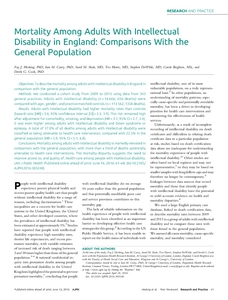Hosking, FJ; Carey, IM; Shah, SM; Harris, T; DeWilde, S; Beighton, C; Cook, DG
(2016)
Mortality Among Adults With Intellectual Disability in England: Comparisons With the General Population.
The American Journal of Public Health (AJPH), 106 (8).
pp. 1483-1490.
ISSN 1541-0048
https://doi.org/10.2105/AJPH.2016.303240
SGUL Authors: Carey, Iain Miller Cook, Derek Gordon
![[img]](https://openaccess.sgul.ac.uk/107988/1.hassmallThumbnailVersion/AJPH.2016.303240.pdf)  Preview |
|
PDF
Published Version
Available under License ["licenses_description_publisher" not defined].
Download (599kB)
| Preview
|
Abstract
OBJECTIVES: To describe mortality among adults with intellectual disability in England in comparison with the general population. METHODS: We conducted a cohort study from 2009 to 2013 using data from 343 general practices. Adults with intellectual disability (n = 16 666; 656 deaths) were compared with age-, gender-, and practice-matched controls (n = 113 562; 1358 deaths). RESULTS: Adults with intellectual disability had higher mortality rates than controls (hazard ratio [HR] = 3.6; 95% confidence interval [CI] = 3.3, 3.9). This risk remained high after adjustment for comorbidity, smoking, and deprivation (HR = 3.1; 95% CI = 2.7, 3.4); it was even higher among adults with intellectual disability and Down syndrome or epilepsy. A total of 37.0% of all deaths among adults with intellectual disability were classified as being amenable to health care intervention, compared with 22.5% in the general population (HR = 5.9; 95% CI = 5.1, 6.8). CONCLUSIONS: Mortality among adults with intellectual disability is markedly elevated in comparison with the general population, with more than a third of deaths potentially amenable to health care interventions. This mortality disparity suggests the need to improve access to, and quality of, health care among people with intellectual disability. (Am J Public Health. Published online ahead of print June 16, 2016: e1-e8. doi:10.2105/AJPH.2016.303240).
Statistics
Item downloaded times since 02 Aug 2016.
Actions (login required)
 |
Edit Item |



